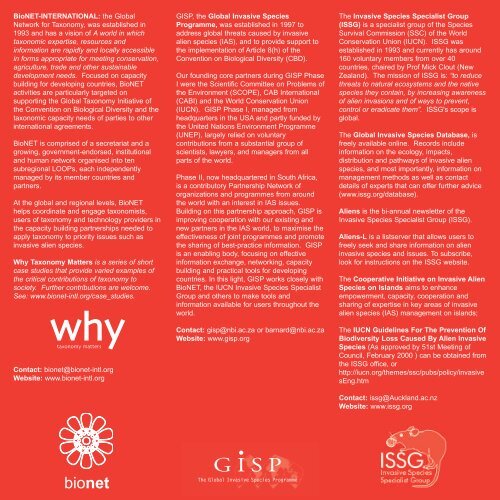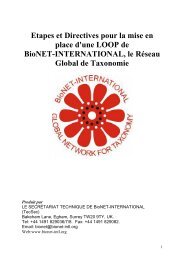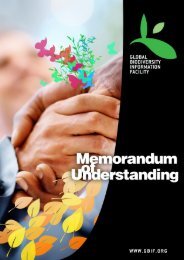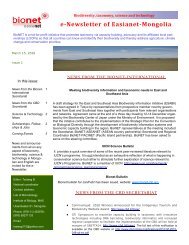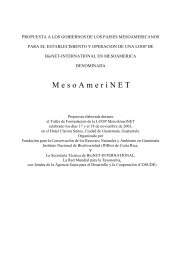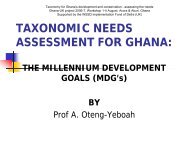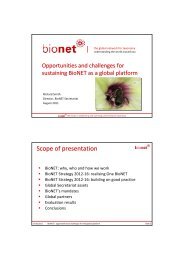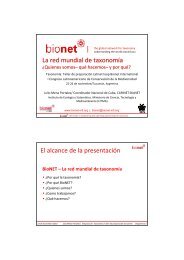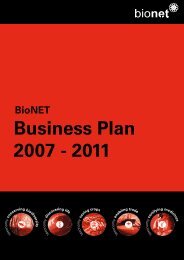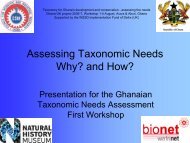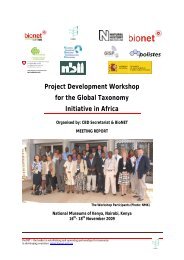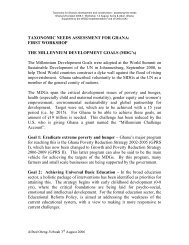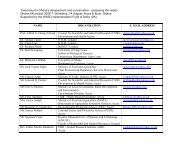Bio cover - BioNET
Bio cover - BioNET
Bio cover - BioNET
Create successful ePaper yourself
Turn your PDF publications into a flip-book with our unique Google optimized e-Paper software.
<strong>Bio</strong>NET-INTERNATIONAL: the GlobalNetwork for Taxonomy, was established in1993 and has a vision of A world in whichtaxonomic expertise, resources andinformation are rapidly and locally accessiblein forms appropriate for meeting conservation,agriculture, trade and other sustainabledevelopment needs. Focused on capacitybuilding for developing countries, <strong>Bio</strong>NETactivities are particularly targeted onsupporting the Global Taxonomy Initiative ofthe Convention on <strong>Bio</strong>logical Diversity and thetaxonomic capacity needs of parties to otherinternational agreements.<strong>Bio</strong>NET is comprised of a secretariat and agrowing, government-endorsed, institutionaland human network organised into tensubregional LOOPs, each independentlymanaged by its member countries andpartners.At the global and regional levels, <strong>Bio</strong>NEThelps coordinate and engage taxonomists,users of taxonomy and technology providers inthe capacity building partnerships needed toapply taxonomy to priority issues such asinvasive alien species.Why Taxonomy Matters is a series of shortcase studies that provide varied examples ofthe critical contributions of taxonomy tosociety. Further contributions are welcome.See: www.bionet-intl.org/case_studies.whytaxonomy mattersContact: bionet@bionet-intl.orgWebsite: www.bionet-intl.orgGISP, the Global Invasive SpeciesProgramme, was established in 1997 toaddress global threats caused by invasivealien species (IAS), and to provide support tothe implementation of Article 8(h) of theConvention on <strong>Bio</strong>logical Diversity (CBD).Our founding core partners during GISP PhaseI were the Scientific Committee on Problems ofthe Environment (SCOPE), CAB International(CABI) and the World Conservation Union(IUCN). GISP Phase I, managed fromheadquarters in the USA and partly funded bythe United Nations Environment Programme(UNEP), largely relied on voluntarycontributions from a substantial group ofscientists, lawyers, and managers from allparts of the world.Phase II, now headquartered in South Africa,is a contributory Partnership Network oforganizations and programmes from aroundthe world with an interest in IAS issues.Building on this partnership approach, GISP isimproving cooperation with our existing andnew partners in the IAS world, to maximise theeffectiveness of joint programmes and promotethe sharing of best-practice information. GISPis an enabling body, focusing on effectiveinformation exchange, networking, capacitybuilding and practical tools for developingcountries. In this light, GISP works closely with<strong>Bio</strong>NET, the IUCN Invasive Species SpecialistGroup and others to make tools andinformation available for users throughout theworld.Contact: gisp@nbi.ac.za or barnard@nbi.ac.zaWebsite: www.gisp.orgThe Invasive Species Specialist Group(ISSG) is a specialist group of the SpeciesSurvival Commission (SSC) of the WorldConservation Union (IUCN). ISSG wasestablished in 1993 and currently has around160 voluntary members from over 40countries, chaired by Prof Mick Clout (NewZealand). The mission of ISSG is: “to reducethreats to natural ecosystems and the nativespecies they contain, by increasing awarenessof alien invasions and of ways to prevent,control or eradicate them”. ISSG's scope isglobal.The Global Invasive Species Database, isfreely available online. Records includeinformation on the ecology, impacts,distribution and pathways of invasive alienspecies, and most importantly, information onmanagement methods as well as contactdetails of experts that can offer further advice(www.issg.org/database).Aliens is the bi-annual newsletter of theInvasive Species Specialist Group (ISSG).Aliens-L is a listserver that allows users tofreely seek and share information on alieninvasive species and issues. To subscribe,look for instructions on the ISSG website.The Cooperative Initiative on Invasive AlienSpecies on Islands aims to enhanceempowerment, capacity, cooperation andsharing of expertise in key areas of invasivealien species (IAS) management on islands;The IUCN Guidelines For The Prevention Of<strong>Bio</strong>diversity Loss Caused By Alien InvasiveSpecies (As approved by 51st Meeting ofCouncil, February 2000 ) can be obtained fromthe ISSG office, orhttp://iucn.org/themes/ssc/pubs/policy/invasivesEng.htmContact: issg@Auckland.ac.nzWebsite: www.issg.orgbionet


